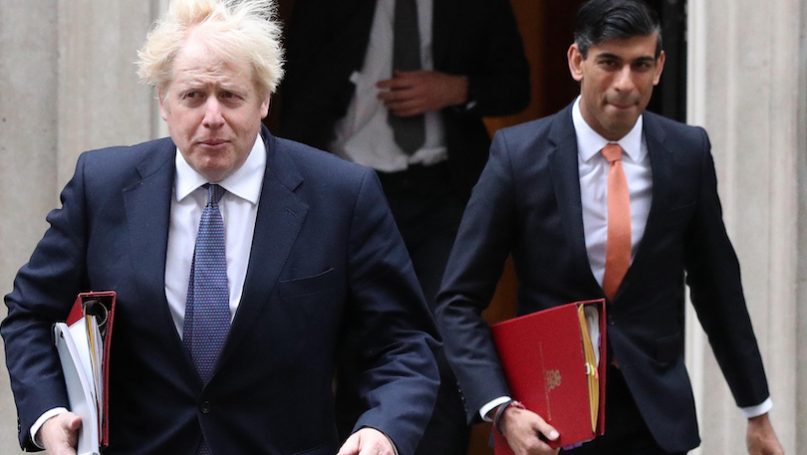
The end of 2020 and early 2021 is likely to be a period of dramatic contradictions for the United Kingdom. While the US has now approved a COVID-19 vaccine, the UK was the first Western country to approve and start administering the vaccine, providing well-needed optimism about the end of a global pandemic. Later in 2021, the UK will host the COP26 climate conference in Glasgow, and Downing Street is eager to convene meaningful debates about an enlarged group of democracies to enhance the G7. At the same time, there is the high risk of a no-deal Brexit and a further breakdown of talks with Brussels, with potentially severe economic consequences as the pandemic and flu seasons continue to rage. And after an initial vaccination drive, there is likely to be a long wait before millions of other Britons, including some in essential care positions, receive the vaccine.
In 2021, the United Kingdom will attempt to perform a global role as a middle power in the midst of recalibration. This role will be ambitious, seeking to redefine the democratic order in international affairs, while engaging vigorously on climate change, and acting as a convenor to the great debates around global governance. As much as Prime Minister Johnson has championed the cause of Brexit, he is no isolationist, and he is keenly aware of the role of history in domestic affairs. Johnson is an internationalist with a deep reverence and nostalgia for the application of Britain’s values, culture, and national interests, on the interests of others. Britain is still able to pack a punch and energise its soft power potential when it recognizes the virtues of its alliances as a vessel in which to advance its national interest. Johnson now has the ability to impart a newer, softer British imperialism that leads other nations to follow Britain not by the power of force but by the power of principle.
In 2021, Britain will likely exist on the fragile spectrum of domestic, internecine squabbles on one end, and convergent, alliance-driven political pursuits on the other. There is the potential for Britain to be internally weak but externally strong, with Johnson’s leadership from Westminster masking disputes and disagreements with the devolved parliaments of Scotland, Wales, and Northern Ireland. The UK may do more to advance global governance and the interests of democracies abroad, while its union at home struggles to stay intact. The political leaders of the UK’s constituent countries have capitalised on the crisis of COVID-19 to prove their mettle as advocates for their regional interests. A no-deal Brexit risks exacerbating pre-existing regional divides and nationalisms, further isolating London from the continent that has struggled to understand, yet has come to accept, the varied whims of its neighbour.
While Britain may have mishandled the COVID-19 pandemic when compared to its European peers, it will likely emerge in 2021 as a centre of the pandemic’s demise and responsible for the growth of a post-pandemic framework. The COP26 summit in Glasgow will be a pivotal moment for the UK, as well as the Scottish government, to portray themselves as leaders in the fight against climate change. The UK will also produce at least one successful COVID-19 vaccine which could prove to be a coup for Oxford and other leading research universities. The Johnson government may wish to use this opportunity to highlight the strengths of having diverse, international student bodies at UK universities to help solve global challenges though rigorous, science-based analysis. Having been mayor of London, Johnson is keenly aware of the economic, societal, and cultural value of foreign students, and the importance of their ability to study and stay in the UK post-Brexit.
Johnson now has the opportunity to introduce a more compassionate conservatism to Britain’s younger voters, many of whom voted to remain in the EU. As the new year dawns, the UK can be outward looking while protecting its values and taking the time required for introspection and re-evaluation of its relations with Europe. The argument for Britain as a European nation does not have to be reopened, but the argument for Britain as a nation that welcomes Europeans, in service of Britain’s national interest and image, may well be demanded.
In the immediate period after the Brexit vote, the UK’s global image was tarnished. A divisive nationalism emerged that targeted immigrant groups such as Poles, leading many to leave the UK and suffer from discrimination. In the years since Brexit, the UK has learned the strengths, and limits of its power, often built around the inclusion or exclusion of certain groups. The UK’s success as a leader in the post-COVID age will likely be due to the activation and recognition of its diverse polity, as opposed to the activation of ethnocentrism amongst white voters that was so critical to the Brexit vote. The coming year will test whether Britain can be a nation of virtuous nationalism, proud of its accomplishments, yet willing to cede its success to a populace that may not always have borne the fruits of the nationalism it espoused.
2021 has the potential to be a year of demystification for Britain’s nationalist tendencies that were introduced to the world with such a forceful bang over four years ago. The economic recovery and global governance framework that emerges from COVID-19 will test Britain’s clout and global outlook beyond Brexit. The United Kingdom as a great power may not be returning, but rather as a power of principle, reason, and pragmatic nationalism, capable of extending a hand to, and indeed welcoming those who dare to deliver history.